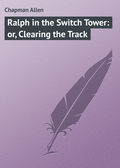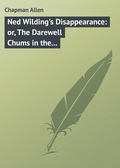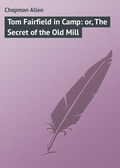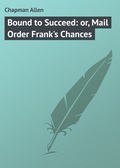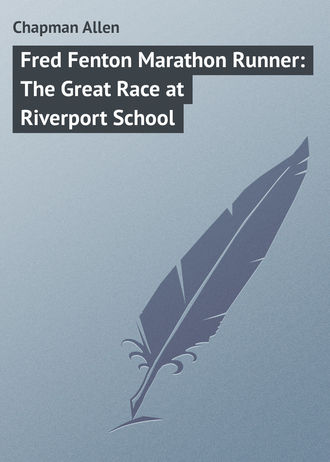
Chapman Allen
Fred Fenton Marathon Runner: The Great Race at Riverport School
CHAPTER XVIII
CAUGHT BY THE STORM
"That settles it, boys!" said Fred, compressing his lips.
"Some more of Corny's smart work, I guess you mean?" ventured Bristles.
"Well, we happen to know he was in town again yesterday afternoon, and putting things together, it looks bad for Corny," Fred explained.
"And I take it you mean to do what you said," Colon remarked; "that is, you promised us if there was another robbery, and that man was seen around, you'd tell everything to Chief Sutton and let him start a hunt to find Corny? Have I got it straight, Fred?"
"You certainly have, Colon, and that ought to be attended to before we start out on our run," Fred continued.
"Sure thing, because when a fellow has broken open a house and taken as much as three hundred dollars in cash, he's likely to get busy right away, and hide somewhere. That other time it was in a cave, and now Corny may have another secret den. It'll be up to the Chief to locate him."
"But I say, Fred, I hope now this won't interfere any with our plans to-day?" expostulated Bristles, while both Sid and Colon immediately looked anxious.
"Only to hold us back ten minutes or so," Fred told them.
"You won't bother going to town, and seeing the Chief personally, will you, Fred, when we've got a 'phone handy right here?" demanded the Carpenter boy, starting in the direction of the front gate close by. The others followed.
"I could answer all the questions he'll want to ask, over the wire just as well as if I were down at headquarters," Fred announced, at which an expression of relief was seen to sweep over three eager faces.
Fortunately the head of the local force was at his desk, engaged in his customary morning duties. Fred lost no time in getting down to facts, and from what the other boys, listening close by, heard him say, his astonishing communication must have created quite a lively panic at headquarters.
For some time after telling what they had learned when passing through that particular stretch of woods the week before, Fred was kept busy answering questions. He explained just why they had seen fit not to mention the matter before, and the reason that ban of secrecy was now removed.
When finally Fred hung up the receiver, and turned around with a smile on his face, as though perfectly satisfied with what he had done, not more than ten minutes had elapsed since their entering the house.
"Thank goodness that business is over with," he remarked, "and now it's up to the police to find the thief, – if they can."
"Huh! my opinion is that this same Corny is a heap too smart to be nabbed by a country cop," asserted Colon, and Chief Sutton, who was a very consequential little officer, would have felt terribly hurt could he have heard the disdainful laugh that went around at these scornful words.
"But let's be making a start!" begged Colon, anxious to be up and doing, for he had told the others he felt like a wild colt that morning, being fairly crazy to get to running.
In five minutes they were far beyond the town limits, running two and two along the road, and taking things fairly easily in the start.
A wise athlete never pushes a willing horse to begin with. After getting well warmed up, it is safe to increase the pace, always holding in the very best for the emergency that is apt to come in every race, some time or other.
Several miles were soon put behind them. Fred and Colon led, with the other two at their heels, and all running easily. Indeed, though it is not considered the best thing to do when running, the two leaders occasionally exchanged a few words, cutting their sentences down to as brief a span as possible. As a rule they maintained silence, each having his teeth set, and breathing through his nose as much as he possibly could.
These lads had learned all the known rules affecting long distance running, and they had also found more or less benefit from practicing them. Time did not enter into their calculations on this occasion, to any great extent at least. Of course they sprinted occasionally, and the minutes were noted at such times in an effort to learn a little about the probable period between certain points, where they figured on making their gains.
Possibly of the four Bristles showed more signs of being pressed than any of them. He had always been a short distance runner, like Felix Wagner of Mechanicsburg, but this year both boys hoped to break into the long distance class. Neither Bristles nor Sid happened to be built just right for such a task. On the other hand, Colon was long and rangy, and capable of tremendous speed, while Fred had the staying qualities so necessary in Marathon runners.
As a rule it will be found that the best long distance runners are the stocky, small men, like the wonderful Englishman, Shrubb, who astonished everybody in our own country by his great record some years back. While hardly reckoned small, Fred Fenton was in just that same class, for his muscles were as hard as they could possibly be, and he always kept himself in prime condition for work.
When, after a certain length of time, the four boys arrived at the birch trees by which Fred had marked the place where they could turn into the woods in attempting that short-cut, they had seen no other competitor on the road. No doubt at some time during the day all of those who meant to take part in the great run expected to cover the whole course, so as to get familiar with its peculiarities, but Fred and his mates were just as well pleased not to run across any of them thus early in the morning.
"Now, here's where we want to keep our eyes about us," remarked Fred, "so as to know the trail by heart. All of us but Sid have already been across to the other road, but on that account don't think you know it all. Observe everything around, and make a mental map of the course. It'll be a great help, I tell you."
"Point out the blazes you were speaking about, so I can watch for them," Sid asked them, as they stood there in a bunch, breathing hard, and cooling off, for it had been a warm run, and the atmosphere felt unusually heavy.
"There's one good thing," Fred went on to say, "we don't have to pay any attention to the other side of the trail. What I mean by that is this: lots of fellows can take notice of how a trail looks, and think they've got it down pat in their minds, but let them start back over it, and the landmarks will never be the same, so it's the easiest thing going to get lost on the return trip, where the blazes you made fail to show. It happens that we have to pass through here only one way."
"Great Caesar! wasn't that a growl of thunder?" cried Colon in dismay.
"Nothing more nor less than that," replied Fred, "and if thunder stands for anything, we're going to get that rain after all."
"Shucks! why couldn't the measly old storm have held off till we reached home?" Bristles wanted to know. "Here we are more'n ten miles away from town, and dressed in the airiest duds going. If we get soaked, we'll be shivering like fun."
"What's the answer, Fred? Tell us your opinion, and whether we'd better turn back, or try to push on through this neck of woodland and marsh?" When he put this question, Colon betrayed a trace of uneasiness, for the prospect was not a very pleasant one, no matter how they looked at it.
"There's no use turning back," the leader explained, "because the nearest house would be several miles away. I don't know just how it might be if we kept along the road here. But there's that tollgate and shanty on the other road; if we could only make that, we'd find shelter."
"Move we try," snapped Bristles, who was for action all the time, and liked to settle questions as Alexander is said to have cut the Gordian knot, decisive work, rather than sitting down to unravel problems.
There being not a single dissenting voice raised, the proposition was declared carried, and with that the four runners plunged immediately into the heavy undergrowth alongside the road.
Fred used his eyes and his memory to advantage. He knew that it would not do to make any mistake, and be lost in that jungle. With a storm coming on, the fierceness of which none of them could more than guess, the one thing they must make sure of above all others was to stick to the trail through thick and thin.
"Say, it's beginning to rain!" called out Bristles, from the far rear,
Sid being just in front of him, and Colon back of the leader's heels.
"What makes you say that?" asked Colon, who did not like to be told of so disagreeable a fact.
"Felt a drop on my face," Bristles explained, "and you could too, if you tried. There! that was another! It is starting in, boys, believe me!"
"He's right about that," Fred called back over his shoulder.
They could run only a small fraction of the time while threading the winding trail through the woods, so that hurrying was utterly out of the question. Thunder had been heard several additional times, and it seemed to be coming closer, if its increasing rumble counted for anything.
The drops began to fall faster and faster, and it became evident that in a few minutes they could expect a downpour.
"One good thing," said the cheerful Sid, "we won't be apt to ruin our best Sunday go-to-meeting glad rags by getting them soaked."
"Good for you, Sid!" called out Fred, "always seeing the silver lining of the cloud, no matter how dark it grows. Whew! that was close by," he added, as a loud crash of thunder sounded.
The rain fell in sheets for a short time; then the thunder died away, though there was no let-up to the fall of water.
"I think we're close to that poor farm," was the announcement Fred made, as he noticed several landmarks that he remembered well.
"Bless you, Fred, for saying that!" cried Colon, "because I'm shivering as if I'd drop to pieces. What do I see over there on the left right now?"
"It's the old rookery of a barn!" Fred told him. "Come on, we'll crawl in, for it's perfectly safe, now that the lightning has gone. By bunching together under the hay, we'll warm each other, more or less, while we wait for the rain to stop."
They saw no sign of anyone around, and as their necessity was very great, the four thinly clad and shivering runners crept under the hay, where they huddled together as Fred had advised.
CHAPTER XIX
THE BOY IN THE HAYMOW
"This is a whole lot better than out there in the downpour," Colon was heard to say, after they had been cowering in the hay for a short time, keeping as close to one another as they could so as to gain additional warmth.
"I should say it was," acknowledged Sid, "and Bristles here is a regular toaster in the bargain. He's as snug and warm as a stove. I'd like to come over and bunk with you, Bristles, some of the coldest winter nights."
"Any boy ought to be warm that's got a decent amount of flesh on him!" declared the one in question; "now, here's Colon who's so thin he hardly throws a shadow at noon; you couldn't expect him to do anything but shake."
"I'd hate to try to sleep in this old place nights," observed Colon, who had been thinking of other things, it seemed, than warmth. "Chances are she's plum full of rats and mice. If you listen real hard, you'll hear 'em carrying on right now, squealin' and squawkin' like."
Accordingly all of them now turned their attention to listening, this avowal on the part of Colon having aroused their curiosity.
"There!" cried the tall boy triumphantly, "didn't you get it that time; and wasn't that a plain rat gurgle, though? They c'n make the queerest noises, seems like, when they want to."
Fred started to move.
"That was no rat, boys," he remarked, in a tone of conviction.
"Wasn't, eh?" exclaimed Colon; "then what'd you call it, Fred?"
"A groan!" replied the other, immediately, at which the others began to sit up, and in various ways denote newly aroused interest.
"A groan, Fred!" echoed Sid.
"Do you mean a human groan?" demanded Bristles.
"There it is again," Fred told them; "if you pay attention, you'll soon say what I do – that it is a human groan."
"But whoever would be grunting like that in this old rookery, I'd like to know?" Bristles continued as though unable to fully grasp the idea.
"For my part," said Fred, bluntly, "I can't explain it. How about you,
Colon?"
"Yes, how is that, Colon?" Bristles hastened to add, as if to lend weight to the sudden demand.
"Me? What should I know about a groan, except that I happened to be the first one to notice the same, and thought it was rats fighting?" Colon expostulated.
"Well, for one thing," Fred told him, "we happen to know that some time ago you had a strong notion you could throw your voice, like the fellow on the stage who makes the dummies in the trunk talk, and say funny things. And it struck me that perhaps you might be trying it out on the dog, meaning your good and faithful chums."
That aroused Colon as few other things might have done.
"Give you my word of honor, Fred, I never thought of such a thing," he said, in the most tragic of ways. "You c'n put your ear close to my mouth, and wait till it sounds again, when you'll find I haven't got any hand in that grunting. Maybe it's a poor pig that's half drowned by the rain coming into its pen near by."
"I know how hogs grunt," Fred told him, "and it wasn't along that line at all. This must be a human being in pain!"
"Whew! if we don't just strike queer happenings wherever we go!" declared Bristles, though from his wide-awake manner it was evident that he did not feel at all averse to these lively episodes coming right along, but rather enjoyed the excitement they brought in their train.
"We ought to do something, oughtn't we, Fred?" asked Sid. "If it did turn out there was a sick man in this old shook, and we learned later that he'd died for want of a little attention, we'd feel mighty sorry."
"First of all, back out, everybody," said Fred. "Then once clear of the mow, we can talk it over, and lay some sort of plan. Push along there, Bristles, you're blocking the line of retreat."
Of course Bristles would not stand for this, and so he began to back out, following the line of least resistance, which in this case was the tunnel by means of which they had crept under the haymow.
Once free and clear, the four runners clustered together, and proceeded to listen attentively again, almost holding their breath in the effort to locate the sound that had startled them so.
"There it is, boys!" exclaimed Fred.
"And louder than before," added Colon, "though that may be caused by our coming out from under the hay."
"No, we're certainly closer to it than before," Fred affirmed, "and that proves it to be over this way."
He started slowly forward. The others followed, it is true, but strangely enough not one of them seemed overly anxious to outdistance Fred, and occupy the position of leader.
It quickly became patent that Fred was right when he said the sound came from that end of the old barn, because, as they continued to advance slowly they could hear it louder and louder. The rain had dropped to a mere drizzle, showing that the storm was about to cease shortly, possibly with the same speed that had marked its opening. As the big drops ceased pattering like hail on the roof, sending many a little rivulet through the holes, they could hear much more easily.
"I see something, Fred!" whispered Colon, in a hoarse tone.
He pointed with a trembling finger as he spoke, and directed by this sign-post all of the other boys were able to distinguish an object that seemed to be extended on the hay.
"Looks like a man or a boy!" gasped Bristles.
"I think it is a well-grown boy!" Fred declared. "And now let's find out what ails him, that he keeps on groaning like that."
He held back no longer, but made straight for the object that had caught their attention. As they came up, all of them could see plainly enough that it was a human being, a fairly well-grown boy, who was lying there on his face.
With every breath he seemed to groan, more or less, and occasionally this would rise to a louder key. This latter was the sound that had reached them while they were under the haymow.
Now Fred was bending over the recumbent figure. Gently but firmly he started to turn it over, when a yell broke out.
"My leg! Oh! my leg's broke all to splinters!" they heard the unknown shriek. Then he seemed to shut his teeth hard together, as though determined that not another cry should leave his lips if he died for it.
Fred had always taken more or less interest in matters pertaining to surgery, at least as far as it is desirable that a boy should dabble in such things. He had borrowed many books from Dr. Temple, and on two occasions had set a broken arm in a fashion that won him words of praise from the physician.
"Let me take a look at your leg, please," he said, soothingly, as he bent down over the half-grown boy, who might be the hand about the poor farm, for he looked thin, and illy nourished, as far as Fred could see at a glance. "Perhaps I can be of some assistance to you, poor fellow. I know a little about setting bones, and such things. And we promise to stay with you, and do what we can to help."
He proceeded to make an examination without any delay or squeamishness. The result was that he discovered a serious fracture of both bones of the leg. Fortunately the break was some inches above the ankle, and if properly attended to, would not result in any permanent injury.
Fred did all that was possible under such conditions, while his three chums hovered near, ready to lend a hand whenever he asked it. The injured boy cried out and moaned a number of times during the time Fred was working, but after Fred had made the rudest kind of a splint, and wrapped the leg with some rags torn from an old linen fly-net that was hanging from a hook near by, the wounded lad admitted that he felt a "heap better."
For the first time Fred began to take notice of him other than as a patient. He found that the boy kept his head lowered, as though endeavoring to avoid curious eyes, and Fred wondered why this should be so, when they had certainly proven themselves to be very good friends of his.
The mystery was, however, soon explained, when Colon was heard to give utterance to a sudden exclamation, and cry out:
"Why, what's this? I've sure met this chap before, or my name isn't Colon. It's Tom Flanders, don't you see, Bristles? He's been gone from home a long while now, and his folks didn't know what'd come of him, and to think that he's been working on this measly little old farm in the bush here all the time."
Fred became intensely interested in his patient. He had not happened to know the Tom Flanders mentioned, but then he had heard more or less about him. It was easy enough now to know why the other was so embarrassed. He had been hiding from everybody, no doubt working here under another name, and hearing not a word as to how affairs in Riverport were progressing.
"Are you Tom Flanders?" he asked the other, quickly.
The wounded boy had turned white and then red several times under the flow of fear, distress and other emotions. He now looked into Fred's eyes boldly.
"I s'pose it ain't no use in denyin' that same, because Bristles Carpenter and Colon here know me," he went on to say, doggedly, after drawing a long breath. "Might as well own up anyway, 'cause I reckon I'm goin' to die. They can't send a dying boy to the Reform School, can they?"
"Have you been working here at this place ever since you disappeared from
Riverport?" asked Bristles.
"Jest about all the time, and gettin' nigh starved in the bargain, 'case they ain't got enough here to feed us," the boy replied, dejectedly.
"First of all," said Fred, "get that idea out of your head that you're going to die, just because of a plain fractured leg. In a month from now you'll be walking around again, and before three months are gone, you wouldn't know anything had ever happened to you."
"That's right kind o' you to say such nice things, mister," Tom Flanders muttered, "but a feller that's headed straight for the Reform School ain't carin' much whether he lives or dies."
Fred looked around at his three chums.
"We'd better tell him, hadn't we?" he asked, in a whisper.
"Sure, the poor fellow's suffered enough as it is, I reckon," Bristles replied.
"Just what I say too," added Colon.
"So go ahead, Fred, and open his eyes. I only hope it'll be a lesson he'll never forget, and start him along a different road after this," Sid gave as his opinion.
"Look here, Tom," began Fred, "you've been hiding-out for weeks now, and all the time believing that they'd send you to the electric chair or the Reform School at any rate, just because you deliberately shoved that little Willie Brandon into the river, and it looked as if he had been drowned. But Tom, they worked over him long enough to bring him back to life again. You ran away before anyone could tell you, and your folks have been nearly crazy trying to find you. Tom, you can come home again, and nobody's going to punish you. It's all right, Tom, and we'll see that you get to where your folks can have you, before to-night!"
The wretched boy looked at Fred for a full minute as though he could hardly believe the glad tidings; then he began to cry like a baby.



